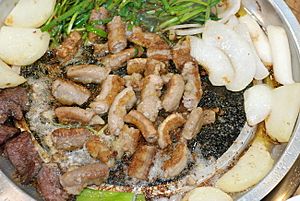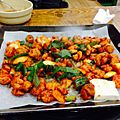Gopchang facts for kids

Gopchang-gui (grilled beef small intestines)
|
|
| Alternative names | Gopchang-gui |
|---|---|
| Type | Gui |
| Place of origin | Korea |
| Associated national cuisine | Korean cuisine |
| Main ingredients | Beef small intestine or pork big intestines |
| 145 kcal (607 kJ) | |
| Similar dishes | Chunchullo |
| Korean name | |
| Hangul |
곱창
|
|---|---|
| Revised Romanization | gopchang |
| McCune–Reischauer | kopch'ang |
| IPA | [kop̚.tɕʰaŋ] |
Gopchang (Hangul: 곱창) is a popular Korean food. It can mean the small intestines of cattle. It can also mean the big intestines of pig. Gopchang also refers to a grilled dish made from these intestines. This grilled dish is often called gopchang-gui (곱창구이), which means "grilled intestines."
This tube-shaped food is chewy and has many elastic fibers. In Korean cuisine, gopchang is cooked in different ways. It can be stewed in a hot pot, which is called gopchang-jeongol (곱창전골). It can also be grilled over a barbecue as gopchang-gui. Sometimes, it is boiled in soup with other intestines, known as naejang-tang. It can even be made into a type of sausage called sundae.
Long ago, gopchang was a common and affordable meal for many people. It was seen as a healthy food because it has lots of iron and vitamins. People ate it to help them feel stronger or to recover from illness. Today, gopchang is considered a special dish. It is often more expensive than regular meat. It is also a popular anju, which means it is a snack often enjoyed with drinks.
How Gopchang Is Made
To prepare gopchang, the intestines are cleaned very carefully. They are rubbed with wheat flour and coarse salt. Then, they are rinsed many times. Any extra fat is trimmed off. The cleaned gopchang is soaked in water to remove any blood.
To make gopchang taste good and remove any strong smells, it is often marinated. Common ingredients for marinating include garlic, ginger, onion, cooking wine, black pepper, and Korean pepper. These ingredients also help to make the meat softer.
For gopchang-gui (grilled gopchang), the marinade ingredients are juiced instead of chopped. This stops them from burning when grilled. Popular marinade ingredients are soy sauce, gochutgaru (chili powder), mullyeot (rice syrup), cheongju (rice wine), and juices from onion, apple, garlic, scallion, and ginger.
The gopchang is first soaked in these seasonings. Then, it is grilled on a lightly oiled pan or griddle. Often, onions and bell peppers are grilled along with the gopchang. Grilled gopchang is usually served with a dip of salt and sesame oil. After eating the gopchang, people often cook Bokkumbab (Hangul: 볶음밥), which is "fried rice," using the leftover oil from the gopchang.
Types of Gopchang and Similar Foods
When gopchang is made from pig's big intestines, it is usually called dwaeji-gopchang (돼지곱창). This means "pig gopchang."
In Korean cooking, there are other similar dishes made from different parts of beef.
- Yang-gopchang (양곱창) is made from beef blanket tripe.
- Makchang (막창) is made from beef reed tripe.
- Daechang (대창) is made from beef large intestines.
Around the world, gopchang is similar to other foods. For example, chitterlings are pork's small intestines. Latin American chunchullo uses small intestines from beef, pork, or lamb. The Spanish word tripas or the English word tripe can also refer to small beef intestines. This shows that eating animal intestines is a practice found in many cultures worldwide.
Some Korean dishes also include tripe. These include stir-fried tripe and gopchang jeongol.
Nak-Gop-Sae (낙곱새) is a spicy soup. It contains octopus, tripe, and shrimp. This dish is also popular as a side dish, sometimes enjoyed with drinks. It is believed that this food was first created in Busan, South Korea.
Gallery
-
Gopchang-bokkeum (stir-fried gopchang)
-
Gopchang-jeongol (gopchang hot pot)
See also
 In Spanish: Gopchang para niños
In Spanish: Gopchang para niños
 | Lonnie Johnson |
 | Granville Woods |
 | Lewis Howard Latimer |
 | James West |





